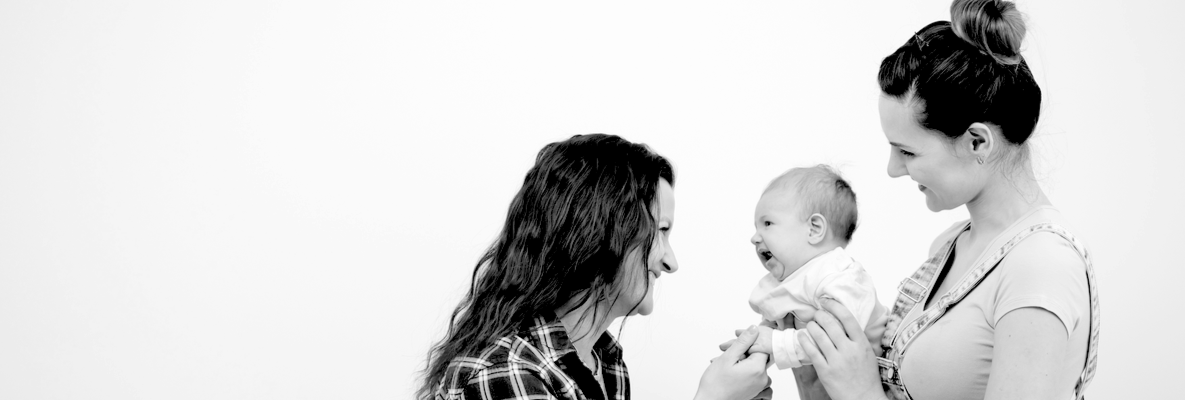LGBTIQ+ parents

While welcoming a new baby is a huge adjustment for any new parent, some research has shown that the transition to parenthood may be more complicated for LGBTIQ+ parents and rainbow families.
For many couples, challenges around conception, sharing the news and facing intrusive questioning from friends, family, colleagues and even health professionals, is followed by difficulties accessing appropriate supports and services during pregnancy. As such, the journey to parenthood can be stressful from very early on – even before the baby arrives.
Health consultations and services
Just as antenatal classes tend to be geared towards heterosexual couples, queer parents often report difficulties finding inclusive parents’ groups, particularly for non-birthing parents. This can compound the isolation felt by most new parents during what can already be an incredibly lonely time.
Other parents report experiencing stigma or hostility from health professionals, and the constant need to explain or “come out” when engaging with services. This can be re-triggering of early experiences with friends and family and highly distressing.
My female partner was excluded from most things and disregarded. Most people don’t count her as “mum” and there’s little to no support groups for non-birth mums.
There were no support groups and living regionally we have no same-sex friends in the same position. We are also isolated from my family so I had very little practical support. I spent the first year feeling like a live-in cleaner.
Impact on relationships
When couples are estranged from family or have strained family relationships, the addition of a new baby can be particularly stressful. Becoming a parent also often prompts reflection of one’s own upbringing and childhood, which can be painful for those no longer in contact with relatives.
“We had a lot of love and support from everyone except my mother, who continues to not be accepting.”
Just as heterosexual couples are required to re-evaluate their roles when a new baby arrives (for example, who stays home with the baby as primary caregiver), queer couples also face changes to their relationship dynamic. While some research has shown that the division of labour in lesbian couples is more equal, other couples report that negotiating new roles can be difficult.
My partner wasn’t happy to just be a support role and wasn’t happy for me to breastfeed. She wanted to be able to bottle-feed and bond with our baby so this caused issues in our relationship.
Perinatal Depression and Anxiety
Although research into perinatal mental health conditions in same-sex parent is limited, one study found that lesbian and bisexual biological mothers were significantly more likely to experience symptoms of anxiety and depression when compared with heterosexual women.
The lack of support from my family, friends and spouses family impacted me. Intense rage, severe anxiety, feeling constantly exhausted, seeming to cry at the drop of a hat, insomnia, forgetfulness, feeling numb, feelings of doubt about being a good mother, wanting to fight over anything and everything, detachment from friends and spouse.
This is important to keep in mind during your journey to parenthood. You can learn more about the signs and symptoms of postnatal anxiety and postnatal depression.
Non-biological parents can also experience postnatal anxiety and depression, which can often go undiagnosed.
I feel that it’s hard for partners to speak about their struggles because the focus is (understandably) not on them. It’s very difficult when others call the birth mother “the mother” as if the baby has only one.
Tips on how to cope – from those who’ve been there:
- Choose care providers who are supportive. There is no need to be treated any differently to the family who are in the next room.
- As the non birthing partner, make it your mission to care for the birthing partner so they have nothing to do or worry about other than caring for the baby and adjusting. It won’t be forever.
- If you decide to co-feed do plenty of research and find a good lactation consultant to cheer you on.
- Introduce yourself as soon as you walk into a room so that it doesn’t get awkward with people not knowing who your partner is and what your pronouns are. And, if you run into any weird situations, give that feedback formally.
- Join a queer support group such as Prospective Lesbian Parents so you have a network behind you. The info and support we gained from this group was invaluable.
- Find support with the National organisation Rainbow Families.
